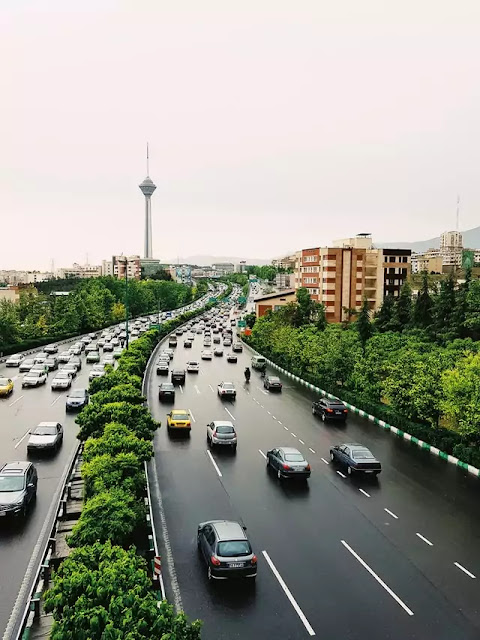As global political prosperity and complexity have increased with evolution, so has Iran's involvement.
The Middle East is one of the most important regions in international politics. And Iran, the second-largest country in the region, has historically been a major player.
At the moment, the most important issue when discussing Iran's foreign policy or its goals is the Iran nuclear deal signed with the West in 2015, which was scrapped by the Trump administration in 2018.
The pace of the country's foreign policy has largely depended on Iran's nuclear program since 1990 and on Western attitudes and decisions surrounding it. The foreign policy of any country will be influenced by the culture and traditions of that country, which is very normal.
But in the case of Iran, the country's religious beliefs and traditions, and culture not only influence but also control the overall policy. The country's government has a Shiite supreme religious leader.
Basically, he determines all the foreign and domestic policies of the country. In addition, his approval is required for any policy. The country's current supreme religious leader is 61-year-old Ayatollah Ali Khamenei. He is the second-highest religious leader in Iran after the 1979 Islamic Revolution.
However, due to his age and physical illness, there has been a lot of speculation about who will succeed in Khamenei. Only time will tell which of Khamenei's 53-year-old son, Mojtaba, or the 60-year-old head of the judiciary, Ibrahim Raisi, will lead the race.
However, many analysts believe that incumbent President Hassan Rouhani could also run in the race. However, the foreign policy and goals of the current religious leader Khamenei and President Rouhani and the strategy they have adopted to implement them have become more important in international politics than the issue of who will be the successor of the religious leader.
Before 1979, the United States and Israel had friendly relations with Iran. Iran was the first country to formally launch its nuclear program in the 1950s with the help of the United States.
But the Islamic Revolution in 1979 brought down the Pahlavi Empire with the fall of the last Shah of Iran, Mohammad Reza Pahlavi, and began straining Western relations with Islamic Shiite-led Iran.
These tensions have often turned into conflicts and still continue. However, these clashes are not seen in Iran or Western lands, but in other third lands.
In the 1990s, Israel declared that Iran's nuclear capabilities had reached the point of threat to the world. Ever since then, the West has pursued a policy of keeping Iran completely isolated.
To prevent Iran's nuclear program from becoming a threat to the world, Western countries continue to impose economic sanctions on Iran, so that the country becomes economically weak.
At the same time, it has carried out assassinations targeting prominent and influential people in Iran. Among them is the assassination of Kashem Solaimani and the November assassination of scientist Mohsin Fakhrizadeh. However, Iran wasn't quite either.
The US base was attacked twice. In addition, Iran has long focused on building and financing various anti-Western organizations. As a result, while not directly involved in the war, Iran has often been involved in proxy wars with the West, especially with the United States and its arch-rival Sunni-majority Saudi Arabia in the Middle East.
Hezbollah in Lebanon, Houthi in Yemen, Assad's forces in Syria, or Hamas in Gaza are all following in Iran's footsteps. Even if it acquires a nuclear capability or weapons, Iran understands very well how helpless they are to the Western alliance.
This is the reason why the country has been advancing in many guerrilla tactics over the years without directly declaring war or engaging in conflict and supporting terrorist groups in various insurgent movements.
However, the country is facing a severe crisis due to the recent tough economic sanctions imposed by the United Nations and the United States. The slow global economic impact of the coronavirus outbreak continues to engulf Iran.
According to the International Monetary Fund (IMF), Iran's foreign exchange reserves in 2018 were 12.3 trillion. Last year, it fell to just 4 billion due to the fall in the export sector due to US sanctions.
The effects of the embargo and the Corona epidemic have created the biggest economic crisis in the country's history and have pushed inflation to nearly 50 percent.
In 2019, when the government unilaterally increased the price of petrol, people took to the streets in at least 100 cities of the country. Amnesty International claims that at least 300 people have been killed so far.
 |
| Iran's Supreme Leader Ayatollah Ali Khamenei speaks at a rally in Tehran, January 1, 2020 / Photo: Reuters |
Besides, dissatisfaction with the government has also increased due to the pressure of unemployment. Now the only way for Iran to emerge from this economic crisis is to ensure that the West lifts the economic blockade on the country.
On July 15, 2015, Iran signed with the five Security Council veto-wielding powers (United States, United Kingdom, Russia, China, France) and Germany, a much-discussed and awaited agreement known as the "Joint Comprehensive Plan of Action", also known as the P5 + 1 agreement.The purpose of the agreement was to ensure that Iran's nuclear ambitions do not become a threat to the world and the West. Iran, frustrated by the economic blockade, also agreed to continue its nuclear program peacefully through the agreement.
But the following year, when Donald Trump came to power, he canceled the deal in 2018 and imposed an economic embargo on Iran, again straining Iran's relations with the West. The Trump administration had to face criticism from other Western countries over the cancellation of the agreement.
But the hope is that as soon as Joe Biden comes to power earlier this year, his Secretary of Defense, Anthony Blinken, announces a return to a "strong and lasting" nuclear deal with Iran.
Following this, talks began in April in Vienna, Austria, with the world powers to return to a nuclear deal with Iran, in which the United States has so far been indirectly involved. Iran wants the West to lift or limit economic sanctions as soon as it enters into the agreement.
But U.S. Secretary of the Interior Anthony Blinken said lifting the blockade would depend on Iran's political conduct in implementing the agreement. This suggests that the United States may not suddenly lift the blockade.
But whatever the timing of the US lifting of the blockade, there is no alternative but to return to the deal to revive Iran's economy. So Iran will have to return to the agreement at the last stage of bargaining with the West.
However, Israel should not be involved in any kind of agreement with China or Iran. Israel has opposed the P5 + 1 deal since 2015 when the Obama administration took the initiative.
The Trump administration's subsequent fulfillment of Israel's aspirations, but the announcement by newly elected President Biden of a return to the treaty has again left Israel in a quandary.
The assassination of scientist Fakhriza took place while Trump was in power at the Pentagon. Iran has blamed Israel for the killings, and Israel has not denied responsibility. In the same year, two mysterious explosions occurred at the Natanz nuclear power plant in Iran.
In the incident, Iranian officials alleged that the Israeli attack damaged the power supply to the Natanz plant. Many types of equipment have been damaged. The centrifuge has been damaged. This attack could have caused even greater danger.
Acknowledging Iran's allegations, Israeli media reported that "the Israeli intelligence agency Mossad carried out the attack on Iran's nuclear facility."
Understandably, in the last days of Trump's rule, all such blows to Iran were intended to ultimately provoke Iran and pave the way for a mistake; At Trump's behest, US forces could take advantage of Iran's mistake.
However, Iran has shown great patience here. Despite threats of retaliation, they did not reach a major military decision.
On the other hand, Saudi Arabia, regional arch-rival, has not previously sought a Western deal with Iran. But recently, Saudi Crown Prince Mohammed bin Salman has shown flexibility towards Iran.
He called Iran a "neighbor" and stressed the need to work for mutual benefit and maintain good relations.
Iran also maintains good relations with Russia and China. However, Iran's relations with Russia have improved since the Pahlavi era. Iran has also received some sympathy from Russia and China over the ongoing blockade of the West by Israel and the United States over the attack on Iran's nuclear power plant and the killings of Kashem Solaimani and Fakhrizadeh.
However, a secret audio interview with Iranian Foreign Minister Javed Zarif has been leaked recently, revealing some startling information.
In that audio interview, Javed Zarif was quoted as saying that Russian Foreign Minister Sergei Lavrov had done everything possible to prevent Iran from agreeing to the 2015 nuclear deal.
According to Zarif, Moscow never wanted Iran to reach an agreement with the West. This comment of his is really wonderful. Because it is generally believed that Russia and Tehran are quite close allies.
Zarif also criticized Kashem Solaimani, saying that during his meeting with the Russian foreign minister, Solaimani wanted him to take a special position. He also said that General Solaimani had effectively dragged Iran into the Syrian civil war.
Because Russian President Vladimir Putin wanted Iranian forces to take part in the ground war in support of the Russian airstrikes in support of the Syrian government.
The leak comes at a time when talks are underway between Iran and world powers to restore the Vienna nuclear deal. Now that the tape has been leaked, the attitude of Russia and the United States towards the agreement and the conditions attached to it have become a matter of concern for Iran.
Perhaps that is why US Secretary of State Blinken is pushing for Iran's political behavior in lifting economic sanctions.
However, to recover the country's economy, Iran will have to return to the agreement on condition. After all, Iran has no military or economic strength to fight the Western alliance.
Moreover, public discontent within the country is also increasing. Therefore, the Rouhani administration with the current radical religious leader Ali Khamenei and whoever succeeds Khamenei's successor and Rouhani's successor in this year's elections, one of the goals of their foreign policy will be to enter into a long-term and lasting agreement with the West and make every effort to implement it.
Read next: Myanmar crisis, Which Way is the International Politics Heading?
Email: trisha.jannat1112@gmail.com




